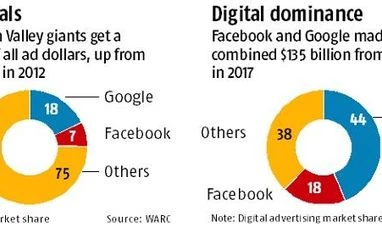Internet ads have their place, went the message, but as something that complements rather than replaces traditional media such as television and billboards. And there will be a place for everybody – from incumbent ad giants such as WPP Plc and Publicis SA to interloper consulting firms like Accenture – in making sure that creative campaigns are distributed in winning ways across the media old and new.
Given their recent tribulations over personal data, the Silicon Valley giants were eager to peddle the same conciliatory narrative. It’s important for Facebook Inc. and Alphabet Inc.’s Google to not be seen as too dominant, for fear of riling the regulators. So they too were quick to highlight the importance of the agencies, saying that no brand wanted to become dependent on any one form of ad distribution.
There was one word that constantly came up in a darker context: Disintermediation. This is the notion that Google and Facebook are increasingly trying to cut out the agency middlemen and women by working directly with the big consumer brands.
It’s not a new threat. Ever since Google bought DoubleClick in 2007, letting advertisers buy ad spots directly online using real-time auction systems, there have been mutterings about Silicon Valley encroachment onto Madison avenue turf. But there’s no denying that the power of Google and Facebook is increasing rapidly, as is shown by their quarter share of all the world’s advertising dollars.
And the irony is that just as the EU is trying to limit the tech giants’ dominance, its new, much-praised General Data Protection Regulation may in fact make it harder to break Google and Facebook’s stranglehold on digital ads.
While the agencies are racing to beef up their own internet businesses, the amount of personal data held by the Silicon Valley duo is already vast – and the new GDPR rules will deepen the competitive moat around it.

So a buyer of a new pair of sneakers might have seen a video ad on Facebook, a banner on a news website and a paid search result on Google. Before now, agencies were able to take inferences from seeing how many seconds somebody dwelled on a video or read a banner before making a purchase, helping determine what ultimately prompted the sale.
Google is cutting off much of that access to outsiders, arguing that GDPR precludes the sharing of such data. But ad agencies point out that the search giant itself is still able to parse the data. That gives it an edge when it approaches brands directly, since it has better insights into their campaigns. Facebook and Google already suck up 61 per cent of all digital ad outlay, and digital spending overtook television for the first time last year, so you can see why WPP and its ilk are worried.
One subscription. Two world-class reads.
Already subscribed? Log in
Subscribe to read the full story →

Smart Quarterly
₹900
3 Months
₹300/Month
Smart Essential
₹2,700
1 Year
₹225/Month
Super Saver
₹3,900
2 Years
₹162/Month
Renews automatically, cancel anytime
Here’s what’s included in our digital subscription plans
Exclusive premium stories online
Over 30 premium stories daily, handpicked by our editors


Complimentary Access to The New York Times
News, Games, Cooking, Audio, Wirecutter & The Athletic
Business Standard Epaper
Digital replica of our daily newspaper — with options to read, save, and share


Curated Newsletters
Insights on markets, finance, politics, tech, and more delivered to your inbox
Market Analysis & Investment Insights
In-depth market analysis & insights with access to The Smart Investor


Archives
Repository of articles and publications dating back to 1997
Ad-free Reading
Uninterrupted reading experience with no advertisements


Seamless Access Across All Devices
Access Business Standard across devices — mobile, tablet, or PC, via web or app



)


